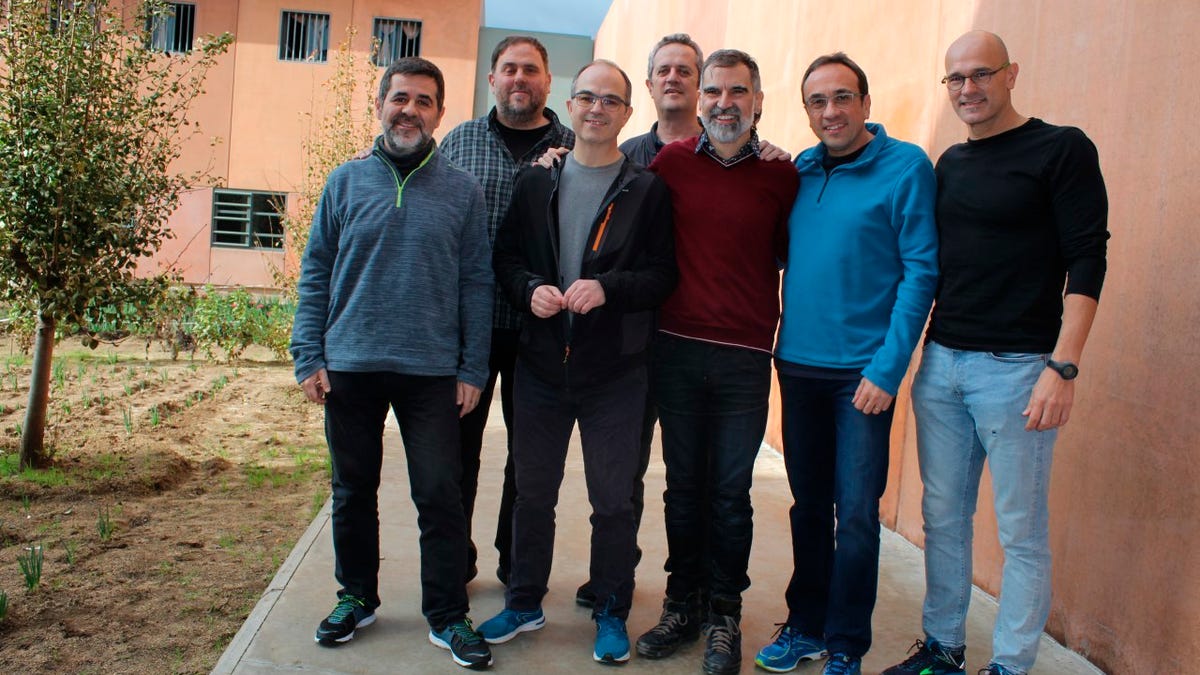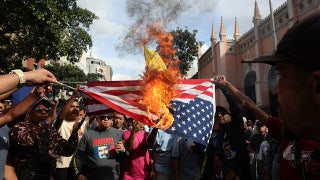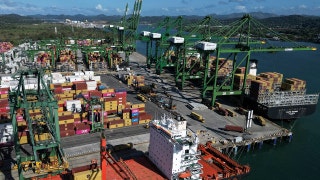
In this undated photo provided by Catalan language association Omnium Cultural, showing jailed Catalan separatist leaders posing for a photo inside Lledoners jail in Sant Joan de Vilatorrada, 50 kms from Barcelona, Spain, with left to right; Jordi Sanchez, Oriol Junqueras, Jordi Turull, Joaquim Forn, Jordi Cuixart, Josep Rull and Raul Romeva. Jordi Sanchez and Jordi Turull, have been in a medical ward since Friday Dec. 14, 2018, as the hunger strike by the group of Catalan politicians enters its third week and begins to take a toll on their health, but they say their upcoming treason trial will allow them to peacefully promote their cause for independence from Spain. (Maria Vernet/Omnium Cultural via AP)
SANT JOAN DE VILATORRADA, Spain – As a hunger strike by jailed Catalan separatist politicians enters its third week and begins to take a toll on their health, they say their upcoming treason trial will allow them to peacefully promote their cause for independence from Spain.
In rare interviews in a prison north of Barcelona, Jordi Sanchez and Jordi Turull, who has been in a medical ward since Friday, repeated calls for dialogue between Catalan's regional government and Spain's central authorities in Madrid. They also rejected any depiction of the secessionist movement in the prosperous northeastern region of Catalonia as violent.
Sanchez told The Associated Press that their trial, set to begin early next year, will be "a unique moment to denounce the attitude of the Kingdom of Spain contrary to the political and democratic rights in Catalonia."
"We are not going to let this opportunity go to waste," he added.
Spain says the 22 defendants in the case are being prosecuted not for their ideas but for defying court orders by holding a banned independence referendum in Catalonia last year and making an illegal attempt to secede.
Some of them have been indicted on charges of rebellion or sedition and face decades in prison in what local media have dubbed "the trial of the century" in Spain's Supreme Court. A preliminary hearing will be held Tuesday, although the defendants are not expected in court until weeks later.
Catalonia's banned independence referendum in October 2017, Spain's violent crackdown to stop it and a subsequent declaration of independence by Catalan authorities led to an unprecedented seven-month takeover by central authorities of the region of 7.4 million people.
More than a year later, the shockwaves from the Catalan independence movement are still being felt across Spain. A political divide is growing between Catalan and Spanish nationalism, a development that has fueled the momentum of a far-right populist party that recently won a dozen seats in Andalusia's regional parliament.
Sanchez emerged clad in three layers of clothes despite normal heating in the modern prison managed by the Catalan government. His doctor says a permanent chill is the result of not ingesting calories and adds that the 54 year-old has lost more than 5 kilograms (11 pounds) since he began fasting on Dec. 1.
Turull, a former candidate to become the region's chief, was sent to the Lledoners prison infirmary Friday because his kidneys have been affected after he shed over 13 pounds in two weeks. He tricks his body to ignore its hunger with nicotine.
Two more former Catalan cabinet members also joined the strike Dec. 3, but other inmates from a competing separatist political group, including former Catalan Vice President Oriol Junqueras, have chosen not to join, again exposing different approaches within the independence movement.
Turull said his protest comes with "a sense of responsibility" and he is not looking to starve to death.
"Its end depends on how far our strength takes us and on achieving our goal of calling attention to Spain's judicial problem," the 52-year-old lawyer said.
Their aim is to press Spain's Constitutional Court to rule on appeals about their political rights and their prolonged pre-trial jailing. The strikers think the court is deliberately trying to block them from reaching the European Court of Human Rights in Strasbourg, where they hope to expose the judicial flaws they see at home.
The Spanish top court has recently begun to issue some rulings in a series of appeals and says that it's working as fast as the judicial calendar allows it to in "dealing with the complexity of a case that affects fundamental rights and a careful analysis of criminal law."
Central Spanish authorities see no reason for the hunger strike.
"Their arguments are false. They will have a fair trial because in Spain the judiciary is independent," Prime Minister Pedro Sanchez said recently, adding that his government rejects both taking politics to court and "politicizing justice."
Although Spain's system of appointing top justices and prosecutors has been questioned in and outside Spain, those who think it's working list the numerous sentences against the country's political and economic elite. One such ruling earlier this year led to Mariano Rajoy's ousting as prime minister and brought Sanchez to power.
Sanchez, a Socialist, has tried a conciliatory tone, but his approach has not reduced tensions with the Catalan separatists. Hardening rhetoric against the nationalists has spread across Spain's political spectrum and coincided with the ascent of Vox, a far-right party.
Turull, a longtime secessionist, says Spain's far right is dragging other parties to its extremism and becoming "a machine of generating tensions" in Catalonia. He also says Sanchez should consider dialogue more than ever, including on the underlying issue of Catalan self-determination.
No prime minister in Spain has agreed to that in the past, arguing it goes against Spain's constitution. With polls showing that Catalan society is evenly divided on the issue of independence, Sanchez instead defends more self-government in Catalonia as a solution, and says he would rather spend time talking about social and economic policies.
"There are ways to delve into the core issue without anyone having to give up their fundamental positions," Turull said in the prison visiting room.
But he warned that talks are not going to yield progress if they are done for political gains.
"They should be in the realm of utmost discretion, away from the microphones," he said.
The jailed politician rejects the idea that taking a weekly central government meeting to Barcelona amid extraordinary security measures next week is "a way of showing affection to Catalonia," as Sanchez has put it.
Separatists are supporting protests against the cabinet's presence in the Catalan capital while jockeying for a meeting between the prime minister and Catalonia's regional chief, Quim Torra, whose cabinet has been criticized for not responding effectively to violent protesters.
Turull said those favoring secession "should be stricter than ever against those who make us look bad."
"We have a red line, which is achieving our goals peacefully, using mediation and dialogue. We are never going to put anybody at risk," he declared.








































